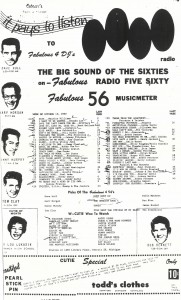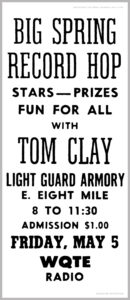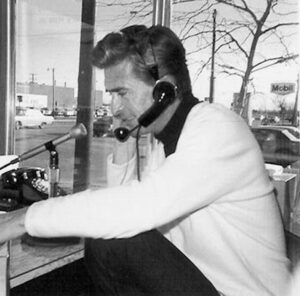 WQTE Launches New Management, Format and New DJs On-Air Policies
WQTE Launches New Management, Format and New DJs On-Air Policies

NEW YORK — The payola panic seemed to have abated but many stations across the country are still changing formats and/or deejays in search of higher audience ratings. Latest outlets to adopt new formats are KPOP and KABC, Los Angeles, and WQET, Detroit.
The Storer outlet, KPOP, is changing its call letters to KGBS – for obvious reasons – and switching from a Top-40-type format to an “adult music” policy, emphasizing show-music and semi-classical, beginning July I.
The ABC outlet, KABC, has put three spinners on notice and is adopting a non-deejay programming plan. Deejays put on four weeks’ notice at KABC were Jim Ameche, Don MacKinnon and John Trotter.
 The station will launch a new non-deejay format July 4–details of which are still hush-hush. One trade rumor has it that the outlet might go on a news-only programming kick, a la a new San Francisco station operation.
The station will launch a new non-deejay format July 4–details of which are still hush-hush. One trade rumor has it that the outlet might go on a news-only programming kick, a la a new San Francisco station operation.
Detroit Station WQET is dropping deejay-controlled disk programming in favor of a strictly supervised “Fabulous 56” format.
The format-switch at WQET is particularly interesting in view of Detroit’s hectic revolving-door situation in the deejay field over the last couple of years.
The station is headed by a team of veteran radio men – prexy Dick Jones and former top jock Ross Mulholland as general manager -and it went on the air last fall with a big-name deejay policy, featuring such top Detroit names as Ed McKenzie and Eddie Chase.

Confronted by lagging time-share sales and ratings, Jones and Mulholland decided to adopt the new “Fabulous 56′ policy last week on advice from local distributors. Programming has been taken out of the hands of the deejays and placed in the hands of management.
A list of 56 current hits is made up from station surveys of local dealers, one stops and juke operators, and a list of “rising tunes” compiled from national trade papers.
Approximately 60 per cent of the station’s programming is based on the 56 disks. The remaining 40 per cent is culled from “old memory songs – two to three years old,” new releases, and four “hit of the week” platters selected by the station’s four deejays.
In the wake of the station’s announcement that “the day of big name jockeys is past,” Eddie Chase left WQTE last week. McKenzie left the station three months ago in a disagreement over music programming policies. At the same time, the station has hired a new program director, Harv Morgan, and deejay Tom Clay. Remaining with the station are spinners Ralph Binge and Danny Murphy.

Clay was fired from WJBK, Detroit, last November after he admitted receiving about $6,000 over a year and a half from small record companies. The jock, along with other WQET deejays, has signed an affidavit that he will not accept payola, said Morgan, who opined that under the station’s new system the jocks will not have any opportunity to accept payola.
Morgan himself will also handle a deejay segment, in addition to his programming duties.
The new format was launched with considerable promotion and fanfare, including a special mailing to time buyers. The copies of Mantovani LP’s and similar non Top-40 packages were sent to the buyers, along with a comment to the effect that this is the kind of music listeners will like, but it doesn’t sell to audiences. END.
_______________
MCRFB Note: Click or tap (and stretch) over each image for largest detailed view.
_______________
Information, credit and source (as published): Billboard, June 20, 1960

![]()
